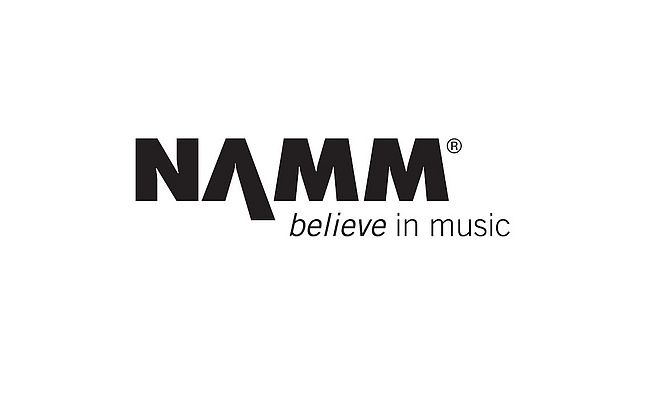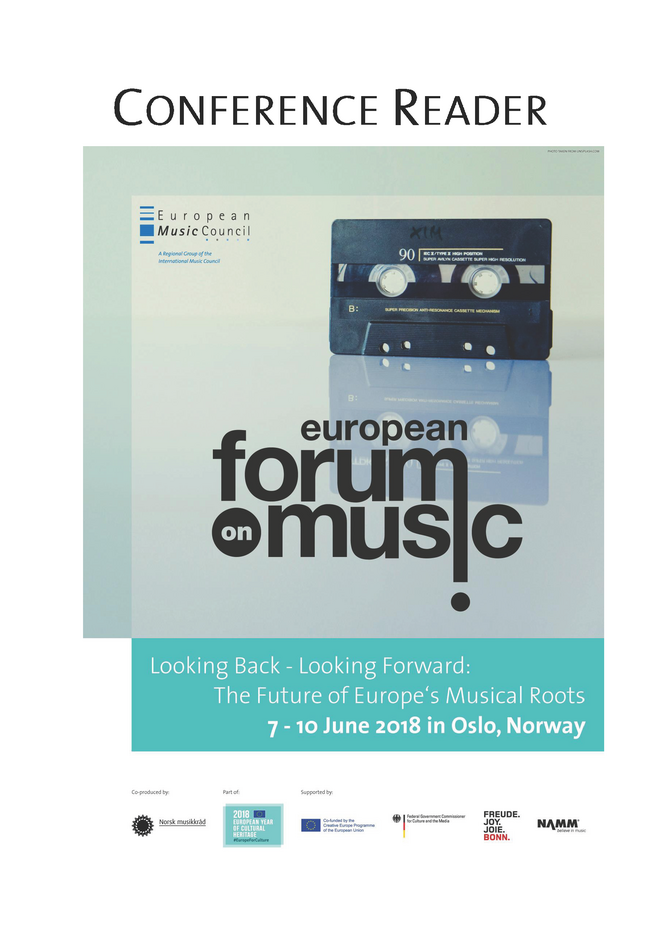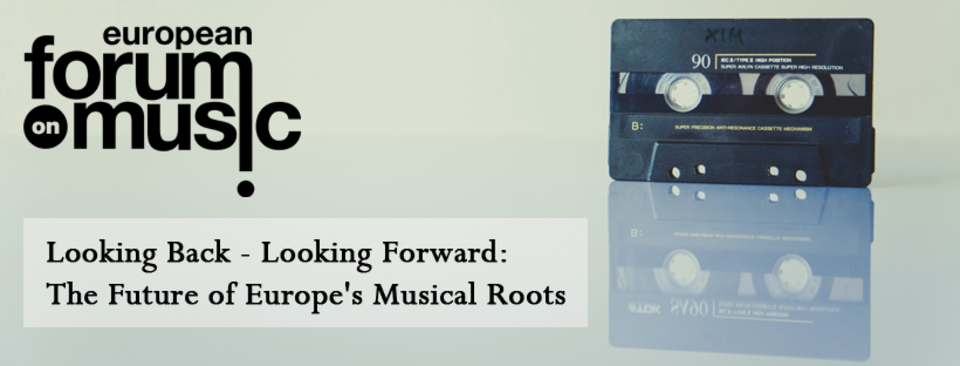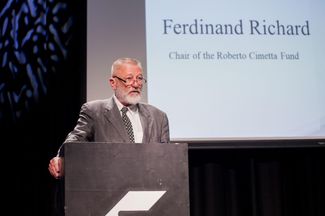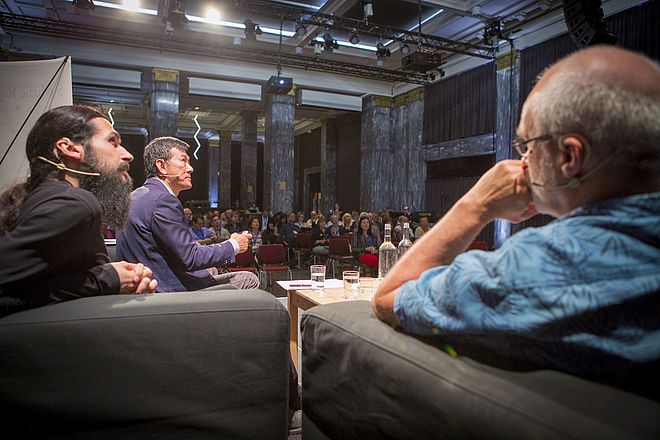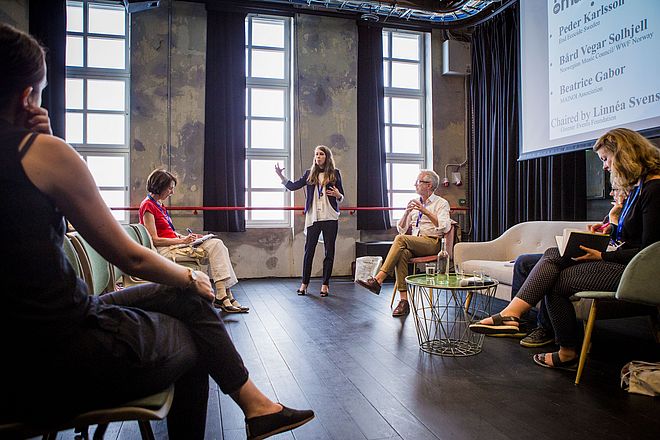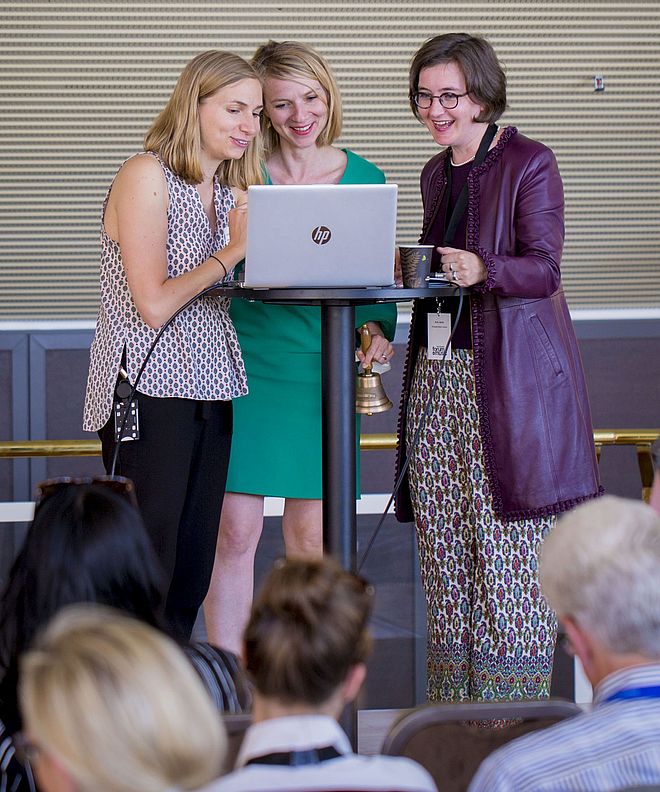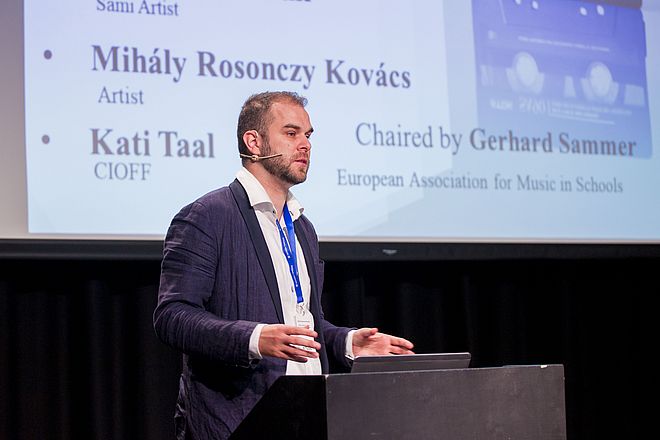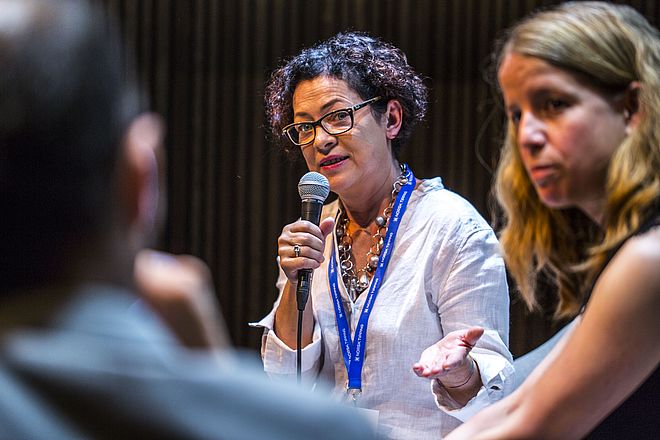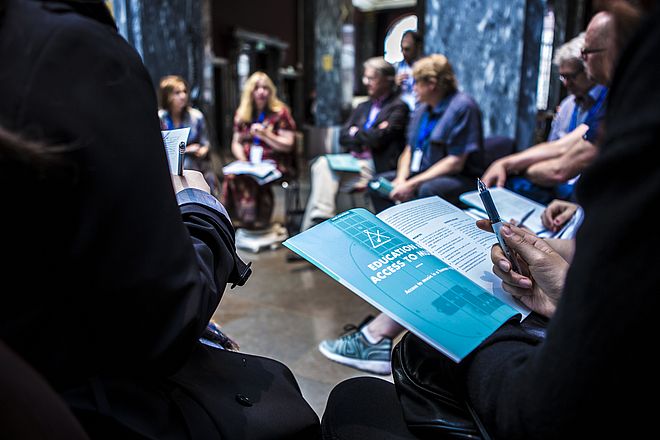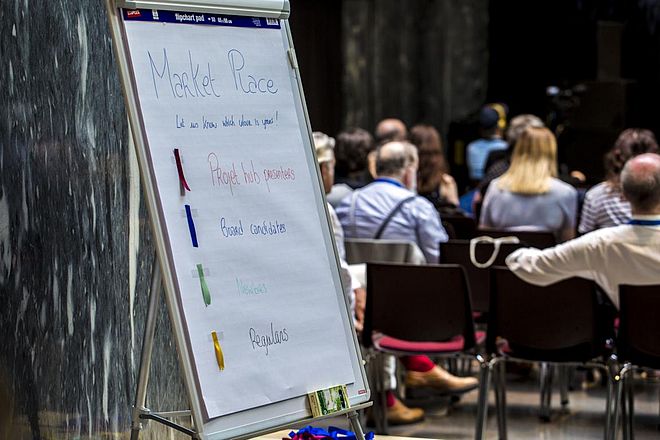This was the European Forum on Music 2018!
These two days have been extraordinarily rich, while this cannot be an exhaustive overview, we will share some highlights including excerpts of the report of the official rapporteur and former board member Gretchen Amussen. These comments are exclusively based on presentations and discussions and do not integrate the remarkable conference reader, which we urge you all to study. The Forum started off with a nice anecdote of Frida Blomgren, Deputy Minister of Culture in Norway, remembering the cassette full of love songs once sent to her and that let her to Norway.
This summary will give you an insight into the discussions we had in Oslo but of course it can never replace the real life experience.
Keynote Speech: Ferdinand Richard
Culture is and always has been the fruit of hybridisation – and thus, for Ferdinand Richard, culture – and music – cannot be a homogeneous artefact. Rather, each of us has his/her own Culture, or “Yoik” (also referred to as “Joik”) to take up Katarina Barruk’s inspiring voice. Beyond this, Richard highlights two areas in which music can prove a critical pivot: peer-to-peer versus global content industries, and cultural diversity as an individual right versus national identity as an obligation. The enormous content industry sector – one to which Barbara Gessler also referred in her presentation – concentrates its power in so-called “golden triangles” which ignore those independent producers and publishers on the fringes. In contrast, the digital shift and extraordinary advances in technology are creating an irreversible decentralisation of art production. Artists exchange directly peer-to-peer, which in turn suggests new opportunities for local cultural policies, in which local communities could become co-working hubs and incubators for local cultural enterprises. Beyond this, within Europe cultural diversity cannot constitute a single model: our identity is constantly changing, and Ferdinand Richard speaks not of projects, but of trajects, a word integrating the concept of trajectory or journey. For Richard, music, by communicating that which is deepest within and farthest beyond, constitutes a bridge – one it is our responsibility and privilege to maintain wide open.
Freedom of Expression
Taking this notion of responsibility a step further, freedom of expression for artists and the “greening of music” represent two immense challenges and opportunities for us as musicians and artists as well as for the societies in which we live. The vibrant testimony provided on freedom of expression by SafeMUSE, Freemuse and From the Vastland show that a global culture of silencing others has risen significantly in the last few years, and that to protect artists and art forms, it would behove us as a music sector to work in concert with human rights advocates and generally, to expand the agenda and enrich discourses. Srirak Plipat, Sara Whyatt, Sina Winter and Jan Lothe Erikson demonstrated the immense need to support artists at risk! The IMC 5 Music Rights can and should constitute a basic framework for all our work in this arena. Further, artistic freedom is better served in the framework of a discourse on the freedom of expression than on its own. One could say that preserving this constitutes a “duty of care” for one another and for the democratic societies we seek to nourish.
Global Warming Awareness
This “duty of care” leads us to the “greening of music”. How in fact can music help develop sustainability in our societies and how can we make this an issue that can be addressed by all? … End Ecocide Sweden and Music Drives Change suggest tools that may be used to create incentives and new mind sets for a respectful environment, be it in areas of production, event venues or even concert travel. Sustainability can be introduced into an arts festival, as the Electric Castle Festival in Rumania has so brilliantly demonstrated for the last few years. With their valuable experiences Beatrice Gabor, Peder Karlsson, Bård Vegar Solhjell and Linneá Svensson gave fresh food for thought and action!
The Future of Performing Arts in Europe Cultural Policy & Funding Mechanisms of the EU
The simultaneous presence of the European Theatre Convention in Oslo offered a rare and wonderful opportunity to meet together with Barbara Gessler via Skype. Gessler encouraged and indeed urged both organisations to continue to make their voices heard in Brussels, where the role of culture is seen as increasingly important. Remarkably, the new Creative Europe proposal foresees a rise in its budget – all the more extraordinary in the face of significant cuts faced by other programmes. Heidi Wiley and Ruth Jakobi guided the audience through the session.
Oral Transmission as Intangible Cultural Heritage
Oral transmission as cultural heritage – with such distinct and beautiful voices from Poland, Roma from Hungary, Estonia, the Sami People, and France’s Occitan culture, show that each of these musics constitute both an individual and a cultural identity, a state of mind, a form of communication and an unwritten literature. As for the example of the Roma from Hungary, this is often the transformation of a tradition that has travelled across Europe and across centuries. Preserving oral traditions that have often all but disappeared and live on through archives often leads to a transformed re-appropriation of these traditions, some of which suffer from misunderstandings due to lack of sociocultural context. These have been brought to life in numerous ways, from creating schools to imagining a folk music karaoke. The Sami Yoik, which Katarina Barruk demonstrated, gave us a glimpse of the powerful and spiritual nature of this music, very much one with a cultural and indeed personal narrative. The session was hosted by Gerhard Sammer.
Rostrum+: The Future of Recent Musical Repertoire
As for today’s contemporary music, the role of public broadcasters is as vital as the ability for concert programmers, halls and orchestras to take risks, not to mention ongoing cooperation between composers, radios and concert halls. Bringing audiences to a place of trust in artistic choices allows for the possibility of offering more daring programs, though the panel suggests that two or three performances of a new work are infinitely preferable to single ones. A deliberate choice to program women composers and an ability to use the composer as a living resource are equally essential. Pascale Labrie, Therese Birkeland Ulvo, Joanna Grotkowska, Davide Grosso and Stefan Forsberg gave a valuable inside into today's contemporary music scene.
European Agenda for Music
As for the European Agenda for Music (EAM), the EMC wanted to provide an opportunity to discuss three key themes in smaller breakout groups. The response from these was very positive.
The first group took a closer look at education and access to music. The group favours translation into local languages and a guide to implementation, especially at the grassroots level, which could prove particularly useful to local and national politicians. This can be furthered still by breaking the Agenda down into its component parts through key phrases and tangible examples of good practice. A possible meeting two years hence would provide the opportunity to measure the distance travelled and make any necessary modifications.
Translating the EAM into local languages will also enhance its usefulness at the local level. Above all, communicate: on social media, within your own organisation, and on every occasion! Connect with other policy documents, and don’t hesitate to present the EAM to politicians, as has been done in Latvia with regards to its new cultural policy. Where possible, get endorsements from the Culture Ministry.
The creation of a European Music Observatory, suggested in working group discussions leading up to the EAM, has been taken up by the European Commission. Through Music Moves Europe, a call for tender for a feasibility study has been issued in view of creating such an Observatory. The EMC is participating in a bid to become a member of the advisory board for the study. The discussion group wished for this to be as inclusive as possible so that in fine, the results can nourish European musical life in all its component parts. This study will not constitute a narrative but should support the music sector, while relevant facts and figures can also make the case for diversity being endangered.
Market Place
As the Master of Ceremony Simone Dudt, Secretary General of the EMC on maternity leave, has led us wonderfully through the Saturday.
The traditional Market Place provided Forum participants with the invaluable opportunity to meet to discuss future collaborations; it also offered an additional opportunity for members to better know the 16 EMC board candidates. The EMC Board election took place the next day during the EMC Annual Meeting.
Conclusion
So to conclude, one is filled with a sense of wonder, of joy, and yet of concern for the many threats we face. More than ever, we have a duty to care. The many inspiring musicians and actors encountered over these two days are showing the way.
“The point is not to explain the world, but to sing it!”








